Discover These 9 Equestrian Sports
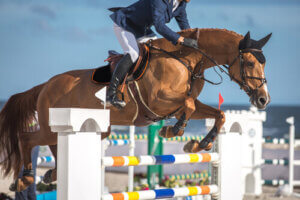
All disciplines that include a horse–or several horses–are known as equestrian sports. They can involve speed, jumping, balls, traction, or throwing. Find out which are the most well-known in the following article.
What equestrian sports exist
Within equestrian sports, we can put together different groups: Olympic, Paralympic, racing, jumping, combined tests, team, ball, dressage, or traction. Among them we can highlight the following:
1. Equestrian jumping
Within riding, this sport – represented in the cover photo of this article – consists of making synchronized movements with the horse so that it can overcome certain obstacles. What’s more, the horse and rider must always overcome the obstacles in a set order. This is one of the most popular disciplines and, in addition to the World Cup, it’s part of the Olympic Games.
There is a table of penalties for deducting points for the errors that the animal makes. These include knocking down, disobedience, the rider falling, excess time, or error in the course.
2. Classic dressage
Also known as ‘training’, it’s another of the Olympic equestrian sports. The objective of dressage is for the animal to obey the rider and perform the trials with harmony and balance. Horses that practice dressage are usually calm, flexible, and attentive only to their leader’s orders. Hot-blooded breeds are often used.
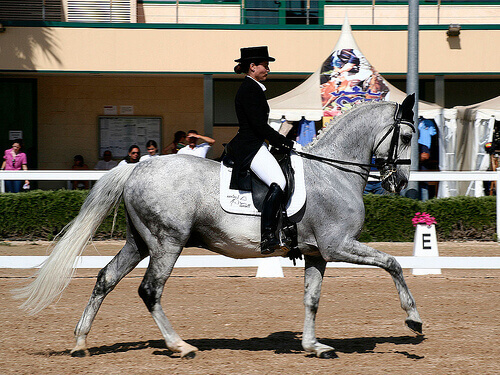
3. Cross-country
Cross-country integrates dressage and jumping, which can take place separately in certain local competitions. This sport tests the speed, jumping ability, and endurance of horses through an obstacle course (water, walls, hedges, etc).
4. Horse racing
Turf or horse racing is one of the oldest sports with horses, dating back to Ancient Greece. Here, spectators can bet on their favorite. The breeds that participate in races are thoroughbreds and quarter horses. They usually gallop in great bounds and have a rider – a jockey – to guide them.
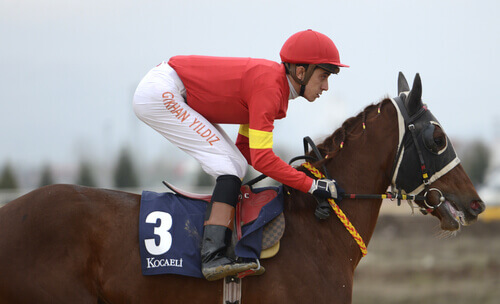
5. Polo
Polo is one of the team equestrian sports, with four riders per side. Here, the objective is to hit a ball with a cue or mallet and take it towards the goal. It takes place on a field of grass of 295 by 164 yards and its origins date back 2000 years to Central Asia. The game lasts two hours, consisting of six ‘chukkas’.
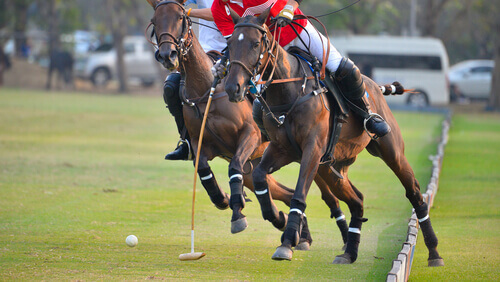
6. Pato
This sport originated in Argentina and emerged as entertainment for the gauchos who used horses on the pampas ranches. It’s known as pato (duck) because, at the start, players used a live specimen of this bird inside a leather bag with ties. Later, they changed the rules and today the game involves a leather fall. Criollo horses are used for competitions.
7. Tent pegging
The International Equestrian Federation recognizes this equestrian sport with ancient origins. Among the rules, we can emphasize that the riders carry swords or lances to pick up diverse objectives, from a ring to a slice of lemon on the ground.
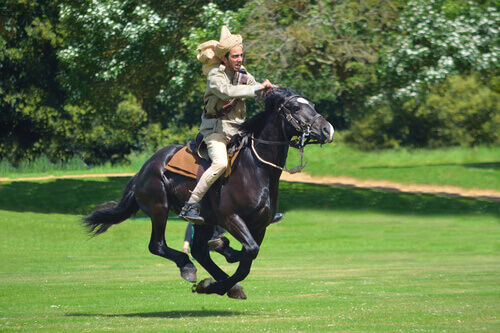
8. Combined driving
This sport consists of driving a group of horses attached to a carriage through different obstacles. There are three types of scoring: Training (harmony and cadence of the horses), resistance (the route is 13.7 miles), and obstacles (20 in total).
9. Endurance riding
Endurance riding is a test that takes into account the skill, speed, and resistance of both the horse and rider. Both cover long distances in a single day in phases, overcoming natural obstacles and various types of terrain. Veterinarians check the animals at the end of each stage and decide if they are able to continue.
All disciplines that include a horse–or several horses–are known as equestrian sports. They can involve speed, jumping, balls, traction, or throwing. Find out which are the most well-known in the following article.
What equestrian sports exist
Within equestrian sports, we can put together different groups: Olympic, Paralympic, racing, jumping, combined tests, team, ball, dressage, or traction. Among them we can highlight the following:
1. Equestrian jumping
Within riding, this sport – represented in the cover photo of this article – consists of making synchronized movements with the horse so that it can overcome certain obstacles. What’s more, the horse and rider must always overcome the obstacles in a set order. This is one of the most popular disciplines and, in addition to the World Cup, it’s part of the Olympic Games.
There is a table of penalties for deducting points for the errors that the animal makes. These include knocking down, disobedience, the rider falling, excess time, or error in the course.
2. Classic dressage
Also known as ‘training’, it’s another of the Olympic equestrian sports. The objective of dressage is for the animal to obey the rider and perform the trials with harmony and balance. Horses that practice dressage are usually calm, flexible, and attentive only to their leader’s orders. Hot-blooded breeds are often used.

3. Cross-country
Cross-country integrates dressage and jumping, which can take place separately in certain local competitions. This sport tests the speed, jumping ability, and endurance of horses through an obstacle course (water, walls, hedges, etc).
4. Horse racing
Turf or horse racing is one of the oldest sports with horses, dating back to Ancient Greece. Here, spectators can bet on their favorite. The breeds that participate in races are thoroughbreds and quarter horses. They usually gallop in great bounds and have a rider – a jockey – to guide them.

5. Polo
Polo is one of the team equestrian sports, with four riders per side. Here, the objective is to hit a ball with a cue or mallet and take it towards the goal. It takes place on a field of grass of 295 by 164 yards and its origins date back 2000 years to Central Asia. The game lasts two hours, consisting of six ‘chukkas’.

6. Pato
This sport originated in Argentina and emerged as entertainment for the gauchos who used horses on the pampas ranches. It’s known as pato (duck) because, at the start, players used a live specimen of this bird inside a leather bag with ties. Later, they changed the rules and today the game involves a leather fall. Criollo horses are used for competitions.
7. Tent pegging
The International Equestrian Federation recognizes this equestrian sport with ancient origins. Among the rules, we can emphasize that the riders carry swords or lances to pick up diverse objectives, from a ring to a slice of lemon on the ground.

8. Combined driving
This sport consists of driving a group of horses attached to a carriage through different obstacles. There are three types of scoring: Training (harmony and cadence of the horses), resistance (the route is 13.7 miles), and obstacles (20 in total).
9. Endurance riding
Endurance riding is a test that takes into account the skill, speed, and resistance of both the horse and rider. Both cover long distances in a single day in phases, overcoming natural obstacles and various types of terrain. Veterinarians check the animals at the end of each stage and decide if they are able to continue.
All cited sources were thoroughly reviewed by our team to ensure their quality, reliability, currency, and validity. The bibliography of this article was considered reliable and of academic or scientific accuracy.
- Disciplines. (s. f.). Fédération Equestre Internationale. https://www.fei.org/disciplines
- Equitación, el deporte más elegante. (2008). CONADE. https://conadeb.conade.gob.mx/Documentos/Publicaciones/Equitacion.pdf
- Hanoverian Horses. (2021, 3 marzo). Oklahoma State University. https://breeds.okstate.edu/horses/hanoverian-horses.html
- Oldenburg Horses. (2021, 30 marzo). Oklahoma State University. https://breeds.okstate.edu/horses/oldenburg-horses.html
- Pacheco, V., Lemos, M. (2022). La equitación: efectos en salud y bienestar [tesis de licenciatura, Universidad EAFIT]. Repositorio Institucional Universidad EAFIT. https://repository.eafit.edu.co/handle/10784/31416
- Trakehner Horses. (2021, 29 junio). Oklahoma State University. https://breeds.okstate.edu/horses/trakehner-horses.html
This text is provided for informational purposes only and does not replace consultation with a professional. If in doubt, consult your specialist.








